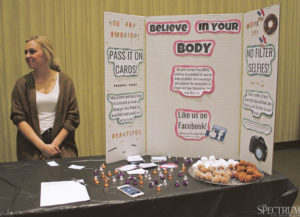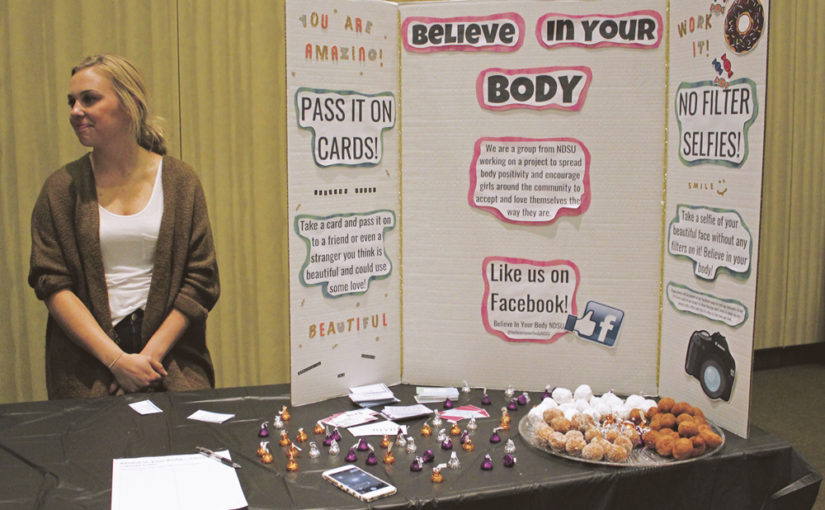
Believe in Your Body member and co-founder, Jafrah Erfle, stands at the group’s booth at the 3rd annual Sex Positivity Expo.
Body positivity is a topic many people hear about, either through advertising or social media, but few are involved in.
Two different groups on campus both have the goal of promoting positive body image and making people love the skin they’re in.
Believe In Your Body
Believe In Your Body is an activist group that started as project for the women and gender studies 350 course.
One member, Jocelyn Fisher, and her group members (Jafrah Erfle and Katelyn Czichotzki) chose the topic because the current generation is “so involved in social media and the constant comparison of how we view our bodies and ourselves.”
When asked about the purpose of the group, Fisher stated, “We wanted to send the message that it’s good to praise yourself and love your body for what it is instead of hating the things you wish you could change. Our bodies do extraordinary things every single day and it’s important to appreciate that.”
The goals of this group are to get involved in the campus and Fargo-Moorhead community, while using social media as a powerful tool to spread the message of body positivity.
They also set other goals, like getting 100 followers on Facebook, 25 “no-filter selfies” at the Sex Positivity Expo and 10 interviews for a video they plan on posting soon.
To get the message out there, this student group has had the help of their adviser and teacher, Erienne Fawcett.
Fawcett has taught the students about the definition of activism and how much work goes into it.
“We have learned that making connections with other people and groups makes a huge difference in getting your momentum to make an impact,” Fisher said.
One great opportunity for this group was getting out their message at the Sex Positivity Expo that was held last month.
The Believe In Your Body booth had cards they passed out with fun and encouraging sayings written on them, like “You are looking gorgeous today” and “If you were a fruit, you’d be a fineapple.” These cards were also given to strangers downtown and at the mall to brighten up someone’s day.
Also at the Sex Expo, the BIYB group got over fifty different people to take “no-filter selfies,” which were taken to have people be proud of how they look without filters or photoshop. When the group posts their video with genuine interviews from real people, they hope those watching will be inspired to love their body more.
Fisher also wants to remind students to “remember how much your body does for you every day and celebrate that. There is nothing vain about appreciating your body or loving the way you look.”
She also had some advice: “Compliment others for what you love about them, too. Spreading a little love goes a long way.”

At the Sex Positivity Expo, the group Believe in Your Body handed out cards with complimentary, uplifting statements.
The Body Project
Another body positivity project happening on campus is entitled “The Body Project,” which is a national program based on research that focuses on promoting young women to resist unrealistic standards while challenging cultural standards of beauty.
There are multiple goals that this group hopes to accomplish, the first of which is to help women on campus become aware of what the media is saying.
Advertisements, TV shows, social media and movies have certain ideal body types that it promotes, telling women to look the way that is portrayed.
The second goal, is “helping women to understand that the ideal standard of beauty is not attainable — real people do not have all the time, money, resources, or, let’s be honest, the photo-editing equipment needed to make them look like celebrities or models.”
Finally, The Body Project wants to give women the tools and ideas necessary to resist the unrealistic body image while appreciating and treating their bodies for the beautiful things they are.
To accomplish these goals, peer leaders hold interactive sessions that have important and eye-opening discussions about body image and how to improve it.
The peer leaders also assist in creating general awareness on campus about having a positive body image.
Unfortunately, some of the recent sessions haven’t gotten the turnout the peer leaders have hoped for since college students are insanely busy this time of year.
“I think when people start to see what a positive impact this program can have, more people will start to come,” Madison Schill, one of the peer leaders, said. “We’re just getting started up this semester and I’m excited to see this program grow.”
For anyone interested in learning more about Believe in Your Body or The Body Project, visit their Facebook pages. Or, for The Body Project, students can go to their page on NDSU’s wellness center website.
